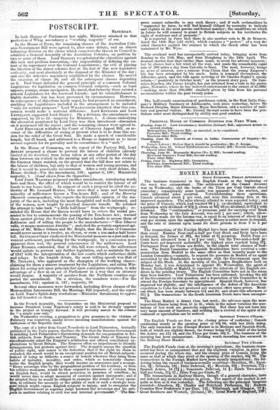In the French Assembly, the Committee on the Ministerial proposal
to increase President Louis Napoleon's salary is said to be strongly opposed to the project as brought forward; it will probably assent to the scheme for "a single year only."
On Wednesday evening, a proposition to give pensions to the victims of February was negatived, amidst divers insulting manifestations against the initiation of the Republic itself.
The copy of a letter from Count Nesselrode to Lord Palmerston, textually published in the Paris papers, discloses the fact that the Russian Government is resisting Lord Palmerston's threatening demands for compensation to Bri- tish subjects from Naples and Tuscany. The Grand Duke of Tuscany has simultaneously asked the Emperor's arbitration and offered conciliatory ex- planations to Great Britain. The Emperor offers no impediment to friendly arrangements, but protests against force. The despatch argues the question of public right, and comes to the deduction that if the right we claim be conceded, the result would be an exceptional position for all British subjects : instead of being as hitherto a source of benefit wherever they bring those habits of industry, morality, and order, which so honourably charac- terize the English people, they would become an annoyance and a scourge. "Every sovereign who by the geographical position of his territory, or from his relative weakness, would be thus exposed to measures of coercion from an English fleet, would be struck powerless in presence of rebellion ; he would never dare to adopt measures of coercion against insurgents; and if he adopted them be would be obliged to examine the details of every opera- tion, to estimate the necessity or the utility of such or such a strategic mea- sure which might expose English subjects to injury, and to recognize the English Government as supreme judge between the sovereign and his sub- jects in matters relating to civil war and internal government." The Em-
peror cannot subscribe to any such theory ; and if such reclamations be "supported by force, he will feel himself obliged by necessity to indicate and explain in the most precise and formal manner; the conditions on which in future he will consent to grant to British subjects in his territories the right of residence and of property."
It is reported in Paris that there is also another note to M. de Brunow, dated the 14th May (old style), which contains a "protest" of a very de- cided character against the manner in which the Greek affair has been terminated by Mr. Wyse.


























 Previous page
Previous page